Andrea Bocelli: Passion and Compassion
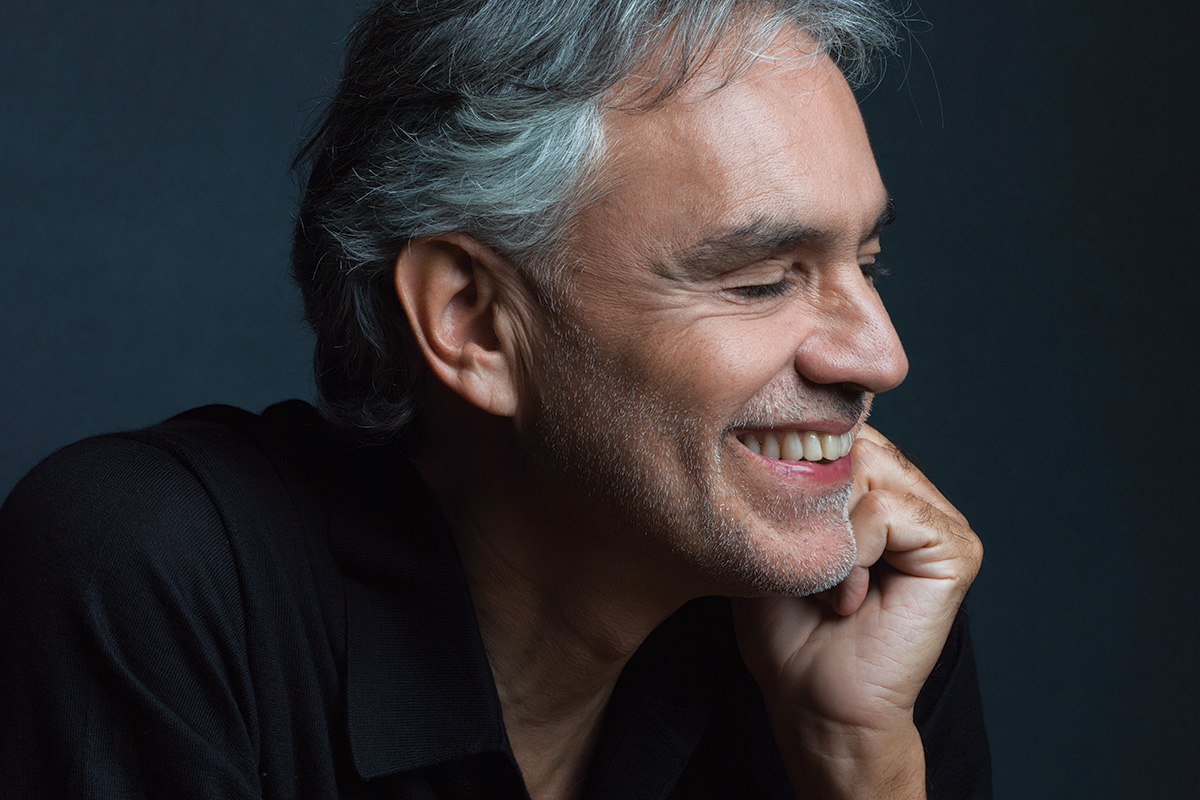

Imagine Italian best-selling tenor Andrea Bocelli, “the darling of the opera-going crowd” (as well as beloved and competent traditional and pop song singer). Now try to visualize him in different scenarios. For instance, in Portofino – a tourist destination regarded as one of the eight wonders of the world –, a tiny and picturesque Italian village with it small square (piazetta). Picture its charming houses facing the marina, as you watch him singing in the open air to a delighted audience. Close your eyes, as he intones Quizas, quizas, quizas in Spanish, accompanied by orchestra, guitars, dancers, and duetting with ethereal-looking and sounding violinist Caroline Campbell. Then try to imagine the unimaginable at the same location: Bocelli smoothly and sweetly stepping into the realm of Bossa Nova, interpreting the all-times hit Corcovado in Portuguese with young Brazilian singer Sandy.
Now switch from that intimate and romantic aura and mood to that of Allianz Parque – a gigantic arena in São Paulo, one of the biggest and busiest urban and economic centers in the world. Imagine him there, on a stage, full of neon lights and technological gadgets of all kinds and surrounded by a crowd of thousands of people. Try to mentally listen to him singing solo the aria Nessun Dorma from Giacomo Puccini’s opera Turandot. Enjoy his rendition of The Prayer, in an unlikely duet with typically Brazilian MPB (Brazilian Popular Music) singer Maria Rita (daughter of deceased musician Elis Regina, the greatest Brazilian interpreter of all times). Moreover, feel all the emotion that overflows, as he sings with Coral da Gente – a choir of children and youngsters from poor communities, educated by the Instituto Baccarelli. Note the passion and compassion involved in his collaboration with the Institute’s project.
Imagine many other incredibly different scenarios in different places of the world. Try to feel the empathy, the chemistry between his dramatic presence, his charisma, and the response by distinct audiences.
The two scenes above, as well as many others in a multiplicity of contexts all over the world, are a hint to the eclecticism of this incredible tenor and of his capacity for interacting with different local populations and professionals, enticing crowds and individuals by means of the poignancy of his renditions, his musical technique and his repertoire.
This brief introduction is but a tiny spark from the bright flame and the luminescent aura of this great singer, songwriter, producer and multifaceted human being. Ladies and gentlemen, I invite you to meet Andrea Bocelli and follow into his footsteps.
“and let ourselves allow our hearts to sing out loud, wild and free” (ray bradbury)
Andrea Bocelli has become a superstar for a variety of reasons, such as his amazing talent, his mastery in connecting with the public, and his capacity for choosing a repertoire that touches the hearts of admirers of classical and popular music.
Bocelli himself comments on the foundations upon which his interaction with audiences everywhere in the world lie:
I’ve always maintained a solar, frank and direct rapport with the public. I haven’t tried to impose on them, forcing them into my professionalism or my artistic beliefs. [Ours is] a rapport based on sincerity and intellectual honesty. [As a result] I have been rewarded with great generosity. 1
His choice of traditional pop songs and well-known classical arias deeply moves the audience. Some critics claim that he builds a bridge connecting the classical and the popular genre. For this reason, he is often regarded as a “classical crossover” musician and is viewed by some specialists as “one of the major crossover artist of all times”. 2 However, Bocelli refuses the term “crossover” as an adequate way of referring to his work. The Italian tenor himself does not endorse the use of this label, because it carries “a certain ambiguity, in which he does not recognize himself”. He claims that labels tend to serve the purposes of musicologists rather than his own. Moreover, in his opinion, the term “crossover” implies a blend of genres, whereas he believes that “classical and pop music are distinct universes, each of which presents its own artistic difficulty, depth and dignity”.
I often propose “lyrical” music in a context which is usually geared towards the pop genre, hoping to impart my preferences, and to make a [classical repertoire] known to the [uninitiated] public. But in fact, I try to keep different genres as distinct and separate as possible. 3
Brazilian singer Giovanna Maira – whom I interviewed soon after the concerts in S. Paulo in September — expresses her admiration for Bocelli’s eclecticism. Although she uses the label “crossover” to refer to his work, she does not imply the “ambiguity” rejected by Bocelli. In fact, Giovanna does not point to a blend of genres – which, in his opinion, would not be acceptable to characterize his work – but rather to his capacity for modulating his interpretation and depth according to each genre in which he specialized. In her words, Bocelli’s profile is marked by extreme versatility. He interprets operatic arias, as well as pop songs. For this reason, he manages to draw a less initiated public towards an erudite niche that is not well-known among the masses which, by the way, is exactly the objective of my own work.
(…) He uses popular technique in his interpretation of songs accompanied by orchestra and clads his singing of erudite music with a popular garment.4
Repertoire
Bocelli’s success and warm acceptance by the public also rely heavily upon the wide range that his repertoire embodies. His choices allow him to reach a variety of cultures and to deeply touch a wide number of people with totally different profiles, tastes, expectations, standards and backgrounds.
He sings and records operas, Italian songs, lyrical arias by many well-known composers, romantic and traditional melodies connected to his own culture as well as to that of other countries:
The fact that I interpret opera on stage (this year, for example, I have interpreted and recorded “Lucia di Lammermoor” and I have also ventured into “Andrea Chénier”) does not mean that I cannot offer high quality selections of musical pieces in different and broader contexts. The lyrical theater, as an artistic container, when well-constructed, remains the ideal instrument to propagate the voice: It is a magical place where humanity tells its story and where it expresses its values. It also allows one to do without electronic amplifying instruments. This does not mean that I cannot, in parallel, appreciate the great arenas, where a direct and spontaneous contact with a much larger audience can also be established. 5
It is needless to list all the songs that have become his unbeatable world hits. Who does not get emotional just by evoking his moving renditions of Con te partiró (also recorded as Time to Say Goodbye), Vivo per Lei, Vivere, The Prayer, Caruso, Panis Angelicus, Les Feuilles Mortes (The Fallen Leaves, also sung in English), Miserere, La Vie en Rose, Nessun Dorma, Ave Maria, Besame Mucho, Per Amore, and so many other songs to which his velvety voice and personal timber assigned a uniqueness never to be forgotten?
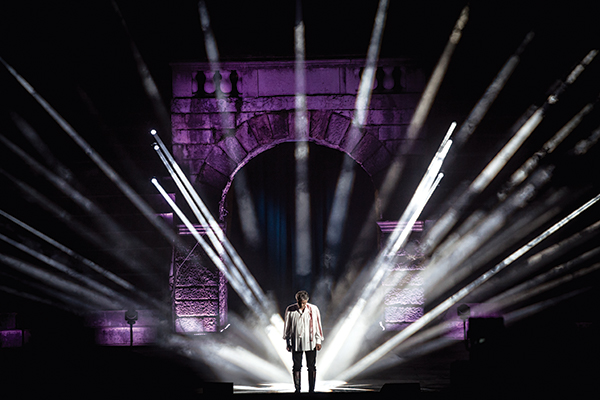
When asked about how he chooses his repertoire, Bocelli replies that the selection must at first be made having in mind the “peculiarities of the vocal organ and its physiology”, and adds that “with maturity”, he seems to “have acquired a solidity that allows him greater freedom”. He acknowledges that he had to wait for decades before he really felt ready to interpret some pieces (such as Turandot). He adds that he prefers titles written in his mother tongue, especially those of his countrymen Giacomo Puccini and Pietro Mascagni, and also the great Giuseppe Verdi. Nevertheless, he admires and chooses musical pieces “from the French lyrical repertoire, ranging from Georges Bizet to Charles Gounod and to Jules Massenet”.
These and many others are composers who have signed immortal masterpieces, pages that do not know borders and are appreciated at every latitude [of the planet]. 6
He highlights that the choice is ultimately made according to emotional criteria, which means he must “fatally fall in love” with a song, in order to make it part of his repertoire. If a musical piece is not suited to his sensitivity, he simply decides to “let it go”.
Even in the pop repertoire, every song has its shape, its sonority, its colors … For example, in my album that will be released soon, “Si”, the whole project has been conceived as a sort of tailored suit, not only in the sense that it reflects my sensitivity and my values, but also that the songs are suitable for my “vocality”, thus allowing me to highlight the peculiarities of my vocal instrument. 7
Italian and international spirit
Bocelli’s diction, dynamics, vocal technique, style and unique interpretation unveil the typically Italian spirit – a spirit that evinces and condenses beauty and emotionality. As we all know, in musicology and criticism, most of the terms are Italian. And resorting to some of them may exemplify and explain, as well as help us understand the way this great tenor sings: his delivery of melodies is colored with a wide choice (and sometimes blend) of tones: appassionato (passionate), affettuoso (affectionate), amabile (pleasant, loving), delicato (delicate). Sometimes he sings con bravura (with courage, force and might), con brio (with liveliness of spirit), in a cantabile way, (in a slow, lyric and flowing style), con fuoco (in a fiery and impetuous mood). His crescendo and diminuendo contours are subtle, yet expressive (espressivo).
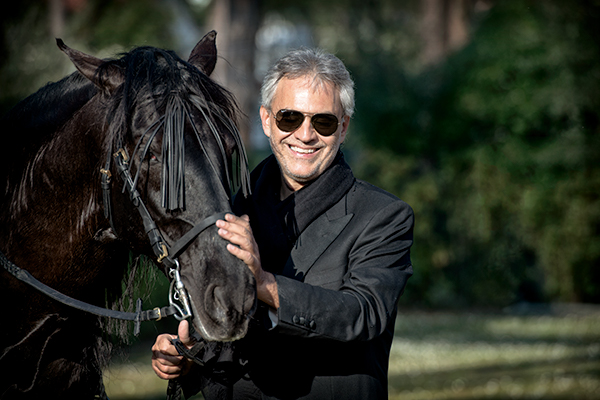
Nobody can seriously dispute that music in Italy is strictly woven together with a strong sense of national identity. Although there is no such thing as a homogeneous “national style”, music has played an important role in the unity of the country, capturing the main features of its distinctive culture. Cultural, political and social issues are often also expressed through music in Italy.
Andrea Bocelli acknowledges his deep connection to the national spirit of his home country, and regards his task, as an artist, as that of revealing this spirit, and making its artistry and musicianship known to the world. He views himself as an authentic patriot – proud of the natural, cultural and artistic diversity of his country.
Being an authentic patriot, I believe Italy is the best place where one can enjoy one’s own life, due to the wide array of natural beauty, of artistic masterpieces that nourish it, from the Alps to Sicily. Making my homeland’s culture (and its beautiful language) known to the world is to me the greatest joy in life. Being immensely complex, my homeland presents lights and shadows. It is not a simple country. Nevertheless, it remains as a marvelous place whose population grows within the realm of beauty – the beauty of its environment, art, inventiveness, cuisine, and feeling. And the true beauty – as intense as everything that it inspires – is intimately intertwined with good. I am personally proud of and feel responsible for the fact that I was bred and born in a country that generated geniuses like Leonardo, Michelangelo and, in the realm of music, Giuseppe Verdi, Giacomo Puccini, Pietro Mascagni. 8
Bocelli goes on to remark that these “geniuses” are artists who have the power to “speak to the heart of each person in such a way as to overcome any cultural barrier”. Here it becomes clear that the Italian tenor does not only capture the spirit of his homeland but also regards the universal nature of his “mission” as a musician as something fundamental.
Indeed, he is not merely an Italian singer, and as mentioned before, he has become one of the major international interpreters of all times. The universal characteristic of his work is achieved for a number of reasons, among which, the following must be considered: firstly, because his delivery of songs is as passionate as that of other contemporary tenors reaching great audiences, without being exaggerated. He sings naturally, so that the melody flows as if it were being spoken. Nothing sounds “highbrow”. Rather, everything seems to be somewhat familiar and close to each and every audience. His interpretations are connected to daily communication, capturing its aesthetic side through simple expression. Simplicity and natural utterance touch the soul in a more immediate and direct fashion, transfiguring routine communication into elevated poetry.
New York-based conductor Steven Mercurio remarks that when Bocelli sings operas, he is “less histrionic” than other opera singers, and is not “overly mannered” so that even people who are coming from a non-operatic background will say, ‘Oh, isn’t it nice to hear that?’ Because Andrea doesn’t sound like he’s exaggerating, he sounds like he’s just singing in a nice lyrical way. So it’s easy for people to approach that without feeling like they’re hearing somebody barking in that exaggerated operatic way. 9
Secondly, he sings in different languages, thus reaching different cultures on individual grounds. Aside from that, he does not rely solely upon his individual charisma, sharing (or having shared) the stage with many classical and pop artists, such as Luciano Pavarotti, Celine Dion, Jennifer Lopez, Zucchero, Julio Iglesias, and Sarah Brightman among many other international superstars.
Last but not least, he stresses that his “rigorous course of study is that of a tenor” and that he is in fact an opera singer, although “it was undoubtedly through the pop that he gained notoriety in the mid-90s”. As award-winning author Hannah Fielding remarks, “when you think of Italy, you think of opera – the two are inextricably bound”.10 Nevertheless, the originally Italian operatic genre has always been welcomed in different countries and has transcended the boundaries of Italy, gaining multifaceted features elsewhere and becoming an international genre. Bocelli emphasizes that he feels responsible for making opera and the Italian spirit more widely accepted, thus awarding it with widespread recognition and acclaim.
Opera is part of that “civilization of beauty” that Italy expresses and that I am proud to be able to divulge. 11
And “having gained credibility in the eyes of audiences following the pop, for over twenty years”, he felt he could then offer the public the music “that he carries in his heart, or the masterpieces of melodrama”. His mission is then that of reminding the public of the popular vocation of the operatic genre.
As I often repeat, I hope to have given my modest contribution by bringing fresh air back to lyrical music, in a world that perhaps risked to forget its popular vocation. 12
“they pierced the black bird’s eyes, so that it could sing more beautifully” (luiz gonzaga)
In the song by Luiz Gonzaga, the bird sings more beautifully, after being blinded. In a poetic sense, Bocelli can be a human and artistic version of this bird. Having been born with congenial glaucoma and becoming utterly blind after an accident in a soccer game, Bocelli has always proved to have an amazing musical talent. Bocelli’s blindness seems to urge him on and to instill a greater artistic sensitivity and a deeper understanding of the ultimate secrets of human essence.
“He sings like a bird” is a cliché which, applied to his renditions, is not merely rhetorical, but rather realistic. His touching interpretations and unique timber make us fly above the dullness of daily life and take us to the highest levels of aesthetic fulfilment. Actually, he sings like an angel and allows us to fly with his invisible wings.
His artistry and musicianship seem to be informed by a process of sublimation, so that his apparent disability is transfigured into colorful musical contours. As psychotherapist C. G. Jung once remarked, “sublimation is part of the royal art where true gold is made”. In a way, Bocelli awards us with the philosopher’s stone, and make his art change the universe into gold. His music has an alchemic force.
However, blindness cannot be regarded solely as something that enhances creativity and musicality. Blind Brazilian singer, Giovanna Maira, remarks that being blind does not make things easier for a musician. On the contrary, “it is a complex barrier [that is hard] to be overcome”. Importantly, Giovanna asserts that Bocelli is to be admired “as a great tenor, rather than a blind person who sings”. The Brazilian singer emphatically expresses her admiration of Bocelli’s art:
High musical quality, excellence in terms of performance are, in my opinion, undeniable virtues, which refer both to this great singer himself and to his crew. But more than these virtues, what I regard as strikingly admirable, is the fact that, being blind (like me), he managed to overcome this constraint and gained space on the entertainment market. This is a goal targeted by many artists, nevertheless achieved by just a few. 13
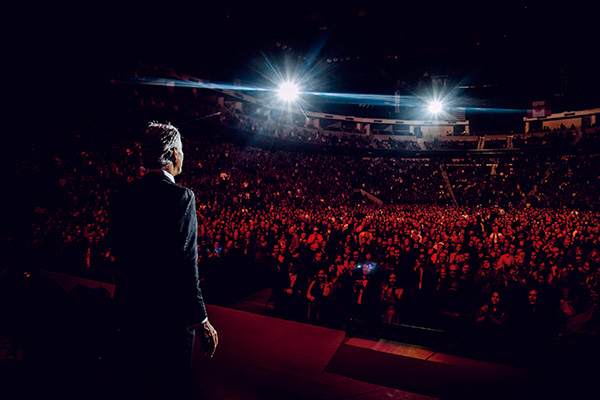
“Music is my medication” – Bocelli reminds us. It is a sublime healing force that changes down-to-earth reality or physical limitations into beauty, delicacy and a source of consolation – both for the artist himself and for the public.
Family
The role of the family both in his life and in his career is fundamental. Bocelli purports that the family is the cornerstone of society, it is a source of affection and a privileged locus where one can search for harmony.14
The greatest challenge in his professional trajectory has been that of reconciling a world star’s schedule, full of international commitments in different countries, with his family life – which remains as the unquestionable priority in his projects.
Luckily, his marriage is an evidence of how this reconciliation can be realised. His wife, Veronica Berti, is also a singer and has successfully duetted with him in different presentations, being also his companion and manager. He admits to the fact that “music has always played an important role in their relationship, and that their affinities are based both on “chemistry and fatal attraction” on the one hand, and musical communion on the other.
Veronica and I love the same kind of music. So, listening and discussing music together is something we do a lot. (…) A successful relationship between two people is an art. There is a natural foundation to it. It is chemistry at play. Unless there has to be a fatal attraction, boredom takes over, but the art lies in preserving this chemical fatal attraction and keeping it alive.15
For Bocelli, “children are the natural consequence of a love project between two people”. Virginia, the couple’s child (who is already learning piano and dance) is, in his words, “the true princess of the family, the sun that illuminates our lives”. Veronica is also like a mother to his children by his first marriage with Enrica Cenzatti: Amos and Matteo. Amos, did not choose music by profession (although he also studied piano, and even played this instrument accompanying his father, for instance, in a beautiful rendition of Elvis Presley’s hit Love me Tender). “His mentality is more focused on the scientific dimension of knowledge”, which led to his education, in aerospace engineering.
Matteo, following into the footsteps of his father, has already faced a gigantic audience in the Roman Coliseum, which housed a large charity concert. There he performed side by side stars such as South Korean soprano Sumi Jo, Russian soprano, Aida Garifulina, Elton John and Steven Tyler. He also recorded beautiful duets with his father. Matteo’s stellar renditions of Ed Sheeran’s Perfect Harmony and Fall on me in collaboration with his father are impressive. Matteo’s velvety voice, his subtle, still passionate interpretation matches perfectly with his father’s charmingly and slightly raspy timber and more intense vocal hues.
The famous tenor acknowledges that he has been greatly influenced by his children, having gained a more accurate understanding of life and affections as well as improving his interpretive sensitivity. from his relationship with them.
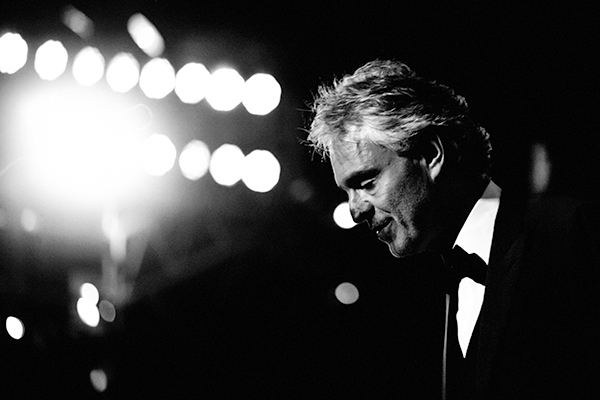
The journey that begins when one is father is exciting and stimulates a true inner revolution. I’ve always tried to convey the values in which I believe to my children. Rather than giving them advice, I’ve tried to act as a role-model to them. And this ethical parameter has helped me not to fail and to be a better person.16
However, the greatest challenge in his life has been to remain as a present and attentive father, despite his international career with the great many commitments it entails. In any case, he makes a point in keeping his family as his priority. 17
His love for his wife and children overflows in his presentations, touching the hearts of the global family that he has deeply reached and moved by the aura of authenticity of feeling that brightens his renditions.
Brazil
In his recent concerts in Brazil (on September 28th and 29th in S. Paulo), Bocelli celebrated his 60th birthday, expressing his gratitude for the strong emotional reverberation emanating from the local audience. He asserts that the warmth and friendliness of the Brazilian people is not only felt during his presentations, being extended to domains transcending the realm of concert arenas. For him, the striking empathy and chemistry between the stage and the public rely upon the “culturally rich, joyful and passionate” nature of the local population. “Being in Brazil” – he says – “does not feel to me like being abroad”. “Despite the ocean that separates us, it is as if we were close relatives”. The significant presence of an Italian community that praises and retains many of their traditional values as well the mixture of ethnicities are additional factors that enhance the emotional character of Bocelli’s connection with our country.
The program of his latest presentations here included a first part mostly dedicated to the operatic repertoire and another one including pop classic songs as well as tracks from his new album “Si”.
His philanthropic commitment led him to include in the program the particularly touching participation of the Coral da Gente – a choir maintained by the Baccarelli Institute – a non-profit organization that offers socio-cultural programs to over a thousand lower-income children (from age 4 on). The Baccarelli Institute’s programs include group and individual classes, as well as orchestral, choral and chamber music, introduction to music, and specialization in one instrument or in singing. The institute was created by orchestra and choir conductor Silvio Baccarelli, after a major fire destroyed the Heliópolis slum in 1996. The project was born out of his desire to help affected families. By teaching music to children and young people from the community, Baccarelli tried to offer them a new profession and the possibility of having a more harmonious personal and collective development.
Philanthropy
The greatness of Bocelli’s accomplishments is not to be assessed solely in terms of the large audiences that he manages to reach or by the number of recordings he consistently makes into best-sellers, but also by his commitment as a philanthropist. His deep sympathy for the destitute, illiterate, and sick in Italy and abroad, resulted in the creation (in July 2011) of the Andrea Bocelli Foundation, that raises funds for the implementation and support of two kinds of programs: those aiming at alleviating poverty and those helping individuals overcome physical barriers, caused by illness. The mission of the foundation (as expressed on its official web-site) is to empower people and communities in situations of poverty, illiteracy, distress due to illness and social exclusion by promoting and supporting national and international projects that promote the overcoming of these barriers and the expression of their full potential.18
Bocelli’s activities as a philanthropist also include initiatives in the area of education. One such initiative, for instance, introduces music to 30 schools supported by the St. Luke Foundation for Haiti, based on the belief that artistic and musical development leads to internal harmony and integration with nature, as well as to a more humane interaction and amplified social awareness. It naturally follows that not only individual learners but also communities benefit from the implementation of this project.
Because all the students come from poor economic and social backgrounds, through music they have been able to find a way to consolidate discipline, cooperation, and have moved away from the misery brought on by the grip of poverty. 19
In May this year, the tenor inaugurated a new school in Sarnano (Italy), equipped with a music laboratory.
Bocelli’s commitment to educational causes and with the teaching of music to the destitute has been a crucial feature of his personal trajectory, his collaboration with the Baccarelli Institute here in Brazil (where he was accompanied by the Choir maintained by the institute on his 60th birthday concerts in September) is therefore unsurprising and must be understood as being in keeping with his major life project.
Emergency projects supported by the foundation have also helped rebuild communities after natural disaster or war. Projects of this kind were implemented, for instance, in Italy, after the earthquake that hit and devastated the center of the country, and in Greece, giving assistance to people arriving from war-torn areas in Iraq, Syria and Afghanistan.
The Foundation was created as a response to Bocelli’s desire to express his gratitude to “all good” that he and his family have always received. It was born out of a responsibility to “build a better world, and to “do justice” by “giving the less fortunate a better future and opportunities”. For him, life is a great banquet, and if the minimum required for everybody’s satisfaction is not offered, the feast ends up being a “flop”, a total failure.
Philanthropy is the joy of sharing, it is an act of intelligence even before a moral duty, because – as I have said so many times – life is like a great banquet. (…) And unless a minimum is offered to everyone, the party fails. 20
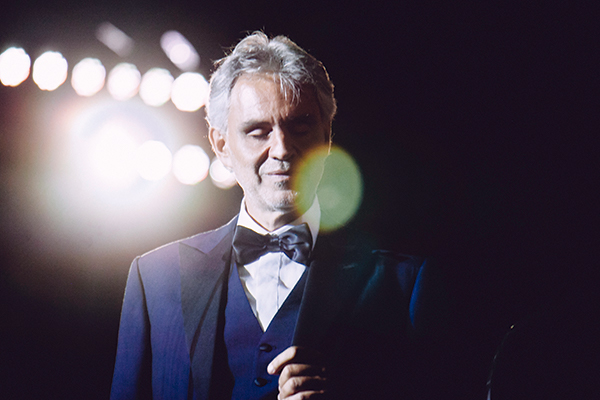
Passion, compassion
By being an artist who not only sings for his personal fulfilment, but also and mostly for a much broader humanitarian cause, one can feel that he sings from his heart and seems to capture the ultimate secrets of human love, devotion, suffering and redemption. His performances are not merely technical. They are magical. Although he sings to large audiences, his renditions create a sense of intimacy and collaboration. An undercurrent of emotion overflows, tinting his impeccable diction and his musicianship with passion.
Philosopher George F. Hegel states that “nothing great in the world has been accomplished without passion” 21. Bocelli admits to the fact that he is extremely lucky because he was able to choose a profession that coincided with his passion for music. Responding to one of my questions in an interview on October 17th, he claimed that, for him, “music is a privileged route leading to beauty”. He asserted that music is “his medication”, a way of “assigning life with delicacy’, a source of inner richness and consolation.” 22
Compassion and generosity of spirit have certainly filled his life with greatness – the very greatness that dwells at the core of Hegel’s idea of “passion”. Passion as greatness transfigures passing life into an eternal legacy.
In Bocelli’s own words, success is pleasant and flattering. However, if it leads nowhere, it ends up not being a quality. Ultimately, the crucial word that appears on top of my list of priorities is “faith”. Faith is the very essence of my life, it is a priceless gift that I treasure dearly, and which sustains me, day after day. Whatever psychiatrists may claim, without Faith, life is a previously announced tragedy. 23
As psychiatrist Viktor Frankl remarked, success, like happiness, cannot be pursued; it must ensue, and it only does so as the unintended side effect of one’s personal dedication to a cause greater than oneself. 24
Bocelli’s art and his actions, like Frankl’s idea of happiness, fill us with joy and hope. His muse and his music not only imply sublimation of imperfection. They are a commitment to effectively fight it and transfigure misery and oppression into spiritual light. His voice, like that of Luiz Gonzaga’s Black Bird, touches our soul and causes us to fly. It allows us to listen to the secret music of the stars. I can only attempt to slightly and humbly hint at a glimpse of alchemic power of this work, through my own feelings, as expressed by my poetry:
Passion, Compassion:
Surge against oppression, misery, starvation
Victory, permanent daylight, mighty night.
Of darkness, the purest melody.
Revolution with no blame or shame.
No fame. No name.
No use, misuse or abuse.
Perennial dame.
Sacred fire, eternal flame:
Music. Muse.
(Free translation of a stanza from “A Tribute to the Sons and Daughters of Passion” – In Melocromática (Melocromatics) (Anspach, Silvia S.) 25
Some speak about the music of the spheres.
I’ve never heard any stars or planets.
But the silence of galaxies and constellations –
reverence for the Word that does not pass –
is tuned in my fingers in dissonant harmony.
It hurts my secrets – in C major and minor.
In the music of night or day,
Exposed flesh, naked soul in polyphony.
Inscribed in body and stars.
Incurable poetry. Primordial, sidereal magic.
Melomania.
(Free translation of a stanza from “Melomaniac” – In Melocromática (Melocromatics) (Anspach, Silvia S.) 26
Notes
The sources of most of the quotations in this article are
a) An interview in which Mr. Bocelli kindly responded to my own questions, referring to some of my ideas in this article.
b) An interview with Giovanna Maira, Brazilian lyrical singer (also blind), who graduated in music at the University of São Paulo – Brazil – and who is a great admirer of Andrea Bocelli’s work.
c) An interview with Andrea Bocelli kindly forwarded to me by “Dançar Marketing”
d) Different web-sites referring to this renowned singer’s work.
References
1 Bocelli’s response to my questions (in writing) – (Interview – October 2018) | 2 http://operawire.com/artist-profile-tenor-andrea-bocelli-one-of-the-major-crossover-artists-of-all-time/ | 3 Idem 1 | 4 Giovanna Maira (Interview – September 2018) | 5 Idem 1 | 6 Idem 1 | 7 Idem 1 | 8 Idem 1 | 9 https://jcdurbant.wordpress.com/2014/01/12/andrea-bocelli-attention-un-miracle-peut-en-cacher-bien-dautres-we-talk-about-beauty-but-we-all-keep-score/ | 10 http://hannahfielding.net/a-brief-history-of-italian-opera/ | 11. Idem 1 | 12 Idem 1 | 13 Idem 4 | 14 Idem 1 | 15 https://www.theguardian.com/music/2014/nov/02/tenor-andrea-bocelli-and-his-wife-veronic-and-their-musical-relationship | 16 Interview “Dançar Marketing” | 17 Idem, Ibid. | 18 https://www.andreabocellifoundation.org/who-we-are/mission-and-vision/ | 19 Idem, Ibid. | 20 Idem 1 | 21 G. F. Hegel, The Philosophy of History. | 22 Idem 1 | 23 Idem 1 | 24 V. E. Frankl, Man’s Search for Meaning | 25 S. S. Anspach – Excerpt from “A Tribute to the Children of Passion” In. Melocromática: Poemas de Tinta, Sons, Sangue e Pó. | 26. S. S. Anspach – Excerpt from “Melomania” In. Melocromática: Poemas de Tinta, Sons, Sangue e Pó.
Silvia Simone Anspach
• PhD in Communication and Semiotics (Catholic University of São Paulo and University of North Carolina) –
• MA in Applied Linguistics (University of Reading – UK)
• Specialist in Analytical Psychology (University São Francisco) and Psychoanalyst (SPOB)
• BA in Romance Languages and Literatures (Catholic University of São Paulo)
• Author of 8 books and hundreds of articles published in Brazil and abroad
• Former Full Professor – Then Guest Lecturer in the USA, Germany, England and Brazil
• Recipient of many prizes in Brazil, Portugal, in the USA, and in the UK, among them a Fulbright Grant (USA) “Best Literary Works of the Century” – REBRA – Brazilian Network of Woman Writers – 2017, Top Finalist New Writer Magazine – Newcastle 2013, 5 Honorable Mentions in Avis, Portugal (2012-2018), 1st Prize in Mulheres Emergentes Award (2010).

